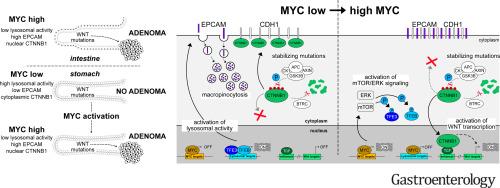当前位置:
X-MOL 学术
›
Gastroenterology
›
论文详情
Our official English website, www.x-mol.net, welcomes your
feedback! (Note: you will need to create a separate account there.)
WNT Oncogenic Transcription Requires MYC Suppression of Lysosomal Activity and EPCAM Stabilization in Gastric Tumors
Gastroenterology ( IF 25.7 ) Pub Date : 2024-07-05 , DOI: 10.1053/j.gastro.2024.06.029 Patrizia Mulè 1 , Daniel Fernandez-Perez 1 , Simona Amato 1 , Daria Manganaro 1 , Paola Oldani 1 , Stefania Brandini 1 , Giuseppe Diaferia 1 , Alessandro Cuomo 1 , Camilla Recordati 2 , Chiara Soriani 1 , Ambra Dondi 1 , Marika Zanotti 1 , Samantha Rustichelli 1 , Andrea Bisso 1 , Salvatore Pece 1 , Simona Rodighiero 1 , Gioacchino Natoli 1 , Bruno Amati 1 , Karin Johanna Ferrari 1 , Fulvio Chiacchiera 3 , Diego Pasini 4
中文翻译:

WNT 致癌转录需要 MYC 抑制溶酶体活性和 EPCAM 稳定胃肿瘤
WNT 信号转导是空间组织排列和调节干细胞活性的核心,它代表了胃肠道癌症的标志。尽管它在驱动肠道肿瘤中的作用已得到充分表征,但 WNT 在胃肿瘤发生中的作用仍然难以捉摸。
我们开发了小鼠模型来控制致癌形式的 β-catenin (CTNNB1) 与 MYC 激活在胃窦 Lgr5 + 细胞中的特异性表达。我们使用了应用于体内和类器官模型的多组学方法来表征它们在驱动胃肿瘤发生方面的合作。
我们报道了胃中组成型 β-catenin 稳定的作用可以忽略不计,并且需要 MYC 激活来诱导胃肿瘤形成。尽管胃腺中生理上较低的 MYC 水平限制了 β-catenin 转录活性,但 MYC 表达增加会释放 WNT 致癌转录程序,在没有直接转录合作的情况下促进 β-catenin 增强子的侵袭。MYC 激活诱导代谢重新布线,通过 mTOR 和 ERK 激活以及 MiT/TFE 抑制抑制溶酶体生物发生。这可以防止巨胞饮作用降解 EPCAM,促进 β-catenin 染色质积累和 WNT 致癌转录的激活。
我们的结果发现了一种新的信号框架,对胃上皮结构和 WNT 依赖性致癌转化的控制具有重要意义。
更新日期:2024-07-05
Gastroenterology ( IF 25.7 ) Pub Date : 2024-07-05 , DOI: 10.1053/j.gastro.2024.06.029 Patrizia Mulè 1 , Daniel Fernandez-Perez 1 , Simona Amato 1 , Daria Manganaro 1 , Paola Oldani 1 , Stefania Brandini 1 , Giuseppe Diaferia 1 , Alessandro Cuomo 1 , Camilla Recordati 2 , Chiara Soriani 1 , Ambra Dondi 1 , Marika Zanotti 1 , Samantha Rustichelli 1 , Andrea Bisso 1 , Salvatore Pece 1 , Simona Rodighiero 1 , Gioacchino Natoli 1 , Bruno Amati 1 , Karin Johanna Ferrari 1 , Fulvio Chiacchiera 3 , Diego Pasini 4
Affiliation

|
Background & Aims
WNT signaling is central to spatial tissue arrangement and regulating stem cell activity, and it represents the hallmark of gastrointestinal cancers. Although its role in driving intestinal tumors is well characterized, WNT’s role in gastric tumorigenesis remains elusive.Methods
We have developed mouse models to control the specific expression of an oncogenic form of β-catenin (CTNNB1) in combination with MYC activation in Lgr5+ cells of the gastric antrum. We used multiomics approaches applied in vivo and in organoid models to characterize their cooperation in driving gastric tumorigenesis.Results
We report that constitutive β-catenin stabilization in the stomach has negligible oncogenic effects and requires MYC activation to induce gastric tumor formation. Although physiologically low MYC levels in gastric glands limit β-catenin transcriptional activity, increased MYC expression unleashes the WNT oncogenic transcriptional program, promoting β-catenin enhancer invasion without a direct transcriptional cooperation. MYC activation induces a metabolic rewiring that suppresses lysosomal biogenesis through mTOR and ERK activation and MiT/TFE inhibition. This prevents EPCAM degradation by macropinocytosis, promoting β-catenin chromatin accumulation and activation of WNT oncogenic transcription.Conclusion
Our results uncovered a new signaling framework with important implications for the control of gastric epithelial architecture and WNT-dependent oncogenic transformation.中文翻译:

WNT 致癌转录需要 MYC 抑制溶酶体活性和 EPCAM 稳定胃肿瘤
背景和目标
WNT 信号转导是空间组织排列和调节干细胞活性的核心,它代表了胃肠道癌症的标志。尽管它在驱动肠道肿瘤中的作用已得到充分表征,但 WNT 在胃肿瘤发生中的作用仍然难以捉摸。
方法
我们开发了小鼠模型来控制致癌形式的 β-catenin (CTNNB1) 与 MYC 激活在胃窦 Lgr5 + 细胞中的特异性表达。我们使用了应用于体内和类器官模型的多组学方法来表征它们在驱动胃肿瘤发生方面的合作。
结果
我们报道了胃中组成型 β-catenin 稳定的作用可以忽略不计,并且需要 MYC 激活来诱导胃肿瘤形成。尽管胃腺中生理上较低的 MYC 水平限制了 β-catenin 转录活性,但 MYC 表达增加会释放 WNT 致癌转录程序,在没有直接转录合作的情况下促进 β-catenin 增强子的侵袭。MYC 激活诱导代谢重新布线,通过 mTOR 和 ERK 激活以及 MiT/TFE 抑制抑制溶酶体生物发生。这可以防止巨胞饮作用降解 EPCAM,促进 β-catenin 染色质积累和 WNT 致癌转录的激活。
结论
我们的结果发现了一种新的信号框架,对胃上皮结构和 WNT 依赖性致癌转化的控制具有重要意义。































 京公网安备 11010802027423号
京公网安备 11010802027423号